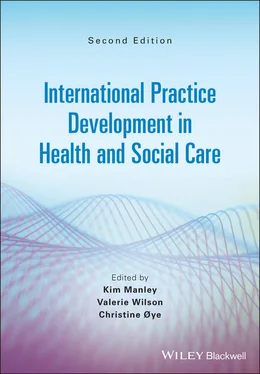Developments since 2008 international edition
Areas of expansion over the past decade have included:
a growing focus around person‐centredness research;
systems‐level working;
integration of facilitation of learning, development and improvement;
growing recognition of workplace culture and how key values of person‐centredness, effectiveness and holistic safety are embedded through both leadership and facilitation; and
a growing continuum of knowledge and research activity embracing knowledge translation, evaluation and the birth of the ‘embedded researcher’.
Person‐centrednessis a central concept of PD informing its purpose.
It has been more than a decade since Brendan McCormack and Tanya McCance published their seminal person‐centred textbook (McCormack and McCance 2010), which has gone on to inform the work of a growing international community of practice and forms the basis of a significant number of doctoral theses. There is an expanding body of evidence around the theory that informs person‐centred practice (McCormack and McCance 2016), the factors that impact on developing person‐centred cultures as well as the facilitation that enables it (Kelly et al. 2018) and the measures that can provide feedback on its achievement (Slater et al. 2017; McCance et al. 2020). Recent emphasis is on the need to develop person‐centred practices and cultures, noting that these are most influential if person‐centredness is to be experienced by all (Edgar et al. 2020). See Chapter 17for a case study which outlines research being undertaken on measuring person‐centredness.
Integrated whole‐systems workingwas the focus of a dedicated chapter in the 2008 edition (McCormack et al. 2008), and has always influenced PD thinking, guiding the formulation and shape of person‐centredness. The role of whole systems approaches and their importance are acknowledged by the World Health Organization in its strategy for developing people‐centred systems (WHO 2015), recognising that all components of the healthcare system are interdependent. The global pandemic shows this clearly, where what happens in one part of the system impacts on other parts – for example, what happens in public health or community settings dramatically influences demand on intensive care beds, resident mortality in residential homes, and staff as well as citizen wellbeing across countries and continents.
PD, building on whole systems approaches, has been used to understand local health systems through drawing on key values, enablers and skills needed to develop the workforce for sustainable person‐centred transformation (Manley and Jackson 2020). Insights embrace an appreciation of the complexity and uniqueness of different contexts, recognising the strategies that work within and across different contexts, appreciatively framing what matters to people in different contexts informed by research perspectives that share similar philosophical underpinnings. The role of systems leadership in complex situations has become recognised as an enabler of collective endeavour (Dreier et al. 2019), particularly practitioner‐led approaches (Manley and Jackson 2020) ( Chapter 14).
Facilitationhas, since PD’s inception, been at its heart, through enabling others to become person and relationship centred and person‐centred leaders. The skills required are embedded in active learning and structured reflection as well as creativity and curiosity and are increasingly recognised as extending across a continuum of complexity in terms of scope and purpose (Martin and Manley 2017). This scope and purpose overlap with relationship‐based approaches to leadership as well as quality and service improvement. Whilst the focus of facilitation is on learning in and about practice and creating learning cultures that prioritise this, there is an increasing recognition that learning, developing and improving are interrelated with knowledge translation, inquiry and innovation. Since the previous edition, the international PD community has pioneered advanced facilitation approaches that embrace all these purposes (see Chapters 10and 11). Such developments further emphasise how PD can complement other activities such as quality improvement, leadership development, systems transformation and innovation processes at every level of health and social care in a way that prioritises the workplace as a key resource for learning.
Growing recognition of the role of positive workplace culturesand how key values about person‐centredness, ways of working and continuing effectiveness are integrated and embedded through both leadership and facilitation at all levels (Manley et al. 2019). Workplace cultures are being recognised more extensively as discrete from organisational cultures in that they directly focus on the interface where care/services are provided and experienced – the microsystems/team level (see Chapters 11, 15and 18). The relationship with organisational and systems enablers in optimising team leadership is also becoming clearer.
Therefore there is a need for a strong focus on workplace culture as a precursor to achieving better service user experiences, better health outcomes, and good places to work that provide better staff experiences, staff wellbeing and retention (West 2016) (see Chapter 13).
A growing continuum of knowledge and research activitynow positively pervades PD. The original PD concept analysis (Garbett and McCormack 2002) built on a broad situational analysis of its potential role and explained how it could add to the body of knowledge based on critical social science (McCormack et al. 1999; Manley and McCormack 2003). Prior to this time, PD was aligned with activities achieving local improvement, but not sustained because it was not embedded in research, policy or commissioning directions. The latter remains a key challenge (although there are examples such as the Essentials of Care programme cited earlier), despite international and national policies that increasingly encourage health and social care professionals and researchers to involve stakeholders and to co‐create knowledge for health improvement and innovation. Nevertheless, there is still considerable potential for practice developers and others in health and social care to work in a bottom‐up way for sustainable change and add to the body of knowledge. Context‐based and participatory research approaches associated with action in the workplace that are practitioner‐led have expanded greatly, with examples in this book that illustrate this (see Chapters 16and 17).
In tandem, but also linked to PD research, has been the continued focus on knowledge translation previously given a high profile in PD methodology because so much research was never used in practice. Knowledge translation research informed the early focus of PD through implementing care that was evidence based and by assumption therefore effective. Knowledge translation has grown into a global movement of its own but continues to share many of the underpinning concepts with PD, such as culture, context, leadership, facilitation, evidence in all its forms, and evaluation. These shared concepts influence not only research implementation but also the implementation of shared values, learning, policy and strategic intent. PD has therefore developed eclectic approaches to using knowledge, blending knowledge and generating knowledge collaboratively in partnership in practice.
PD has excelled in its focus on stakeholder involvement and evaluation informed by the pioneering qualitative researchers Guba and Lincoln (1989) in their Fourth Generation Evaluation approach built on three earlier generations of measurement, description and judgement. They argued that working with stakeholder claims, concerns and issues should be central to evaluation if empowerment, ownership and implementation are to be achieved. This ethos marries well with PD’s principle: collaboration, inclusion and participation. Subsequently, PD has developed its own evaluation approaches such as the ‘Praxis model’ (Hardy et al. 2011) and ‘Good Enough Evaluation’ (Wilson and McCance 2015), but has also engaged extensively with realist evaluation and critical realist approaches (Wilson and McCormack 2006; McCormack et al. 2007). Realist evaluation shares with PD a focus on contexts, acknowledging their complexity and also theorising from this an understanding about what works, why it works and for whom (termed programme theories), combined with appreciative approaches that remain action orientated and participatory in nature, echoing similarities with the action hypothesis discussed in the previous PD text (Manley et al. 2013).
Читать дальше












